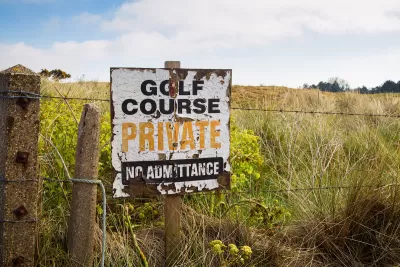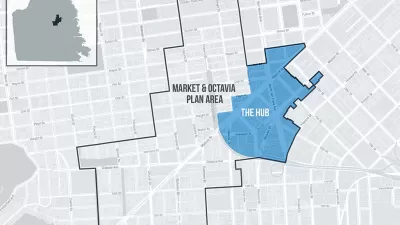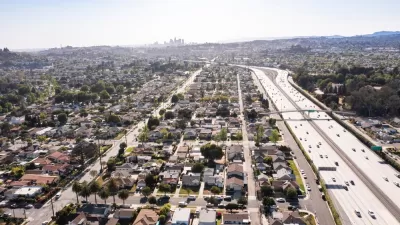Thousands of golf courses have closed in recent years, but the obvious redevelopment opportunity represented by many defunct courses isn’t always easy to realize.

Nearly 1,500 golf courses or country clubs have closed in the United States since 2014, according to research firm IBISWorld, but transforming those properties into development projects hasn’t always proven as easy as developers would like.
A recent article by Andy Medici, paywalled at the Business Journals, provides a rundown of numerous massive projects rising on the former grounds of golf courses—after overcoming stiff odds.
As noted by the article, golf course redevelopment means the potential of thousands of homes, billions of dollars in investment, and the ability to start from the ground up on relatively untouched land.
“But these projects often take years of cutting through red tape […] and for every project that is successful, 10 more never cross the finish line, victims of what he sees primarily as a mixture of zoning hurdles and NIMBYism (not-in-my-backyard-ism) by small but motivated resident groups,” writes Medici.
According to the article, land use regulations are the most common obstacle for golf course redevelopments. “Those obstacles can include contractual obligations put in place when a golf course was first developed to ensure the property cannot be used for anything else or conservation easements,” writes Medici, while citing Jordan Block, a global urban design discipline lead and principal at Stantec and a member of the Denver Planning Board, as a source.
For every example of golf courses with developers ready and willing to transform the land, Medici is able to cite unique opposition to redevelopment plans. Some states and the federal government have begun exploring tools for easing the transition from golf to homes, but the most famous example, a law proposed in the California Legislature in 2022, didn’t win full approval. The law, AB 1910, would have provided funding to local agencies to convert golf courses into affordable housing.
FULL STORY: Closed golf courses, country clubs offer high risks, big rewards for developers

Planetizen Federal Action Tracker
A weekly monitor of how Trump’s orders and actions are impacting planners and planning in America.

Congressman Proposes Bill to Rename DC Metro “Trump Train”
The Make Autorail Great Again Act would withhold federal funding to the system until the Washington Metropolitan Area Transit Authority (WMATA), rebrands as the Washington Metropolitan Authority for Greater Access (WMAGA).

The Simple Legislative Tool Transforming Vacant Downtowns
In California, Michigan and Georgia, an easy win is bringing dollars — and delight — back to city centers.

The States Losing Rural Delivery Rooms at an Alarming Pace
In some states, as few as 9% of rural hospitals still deliver babies. As a result, rising pre-term births, no adequate pre-term care and harrowing close calls are a growing reality.

The Small South Asian Republic Going all in on EVs
Thanks to one simple policy change less than five years ago, 65% of new cars in this Himalayan country are now electric.

DC Backpedals on Bike Lane Protection, Swaps Barriers for Paint
Citing aesthetic concerns, the city is removing the concrete barriers and flexposts that once separated Arizona Avenue cyclists from motor vehicles.
Urban Design for Planners 1: Software Tools
This six-course series explores essential urban design concepts using open source software and equips planners with the tools they need to participate fully in the urban design process.
Planning for Universal Design
Learn the tools for implementing Universal Design in planning regulations.
Smith Gee Studio
City of Charlotte
City of Camden Redevelopment Agency
City of Astoria
Transportation Research & Education Center (TREC) at Portland State University
US High Speed Rail Association
City of Camden Redevelopment Agency
Municipality of Princeton (NJ)





























